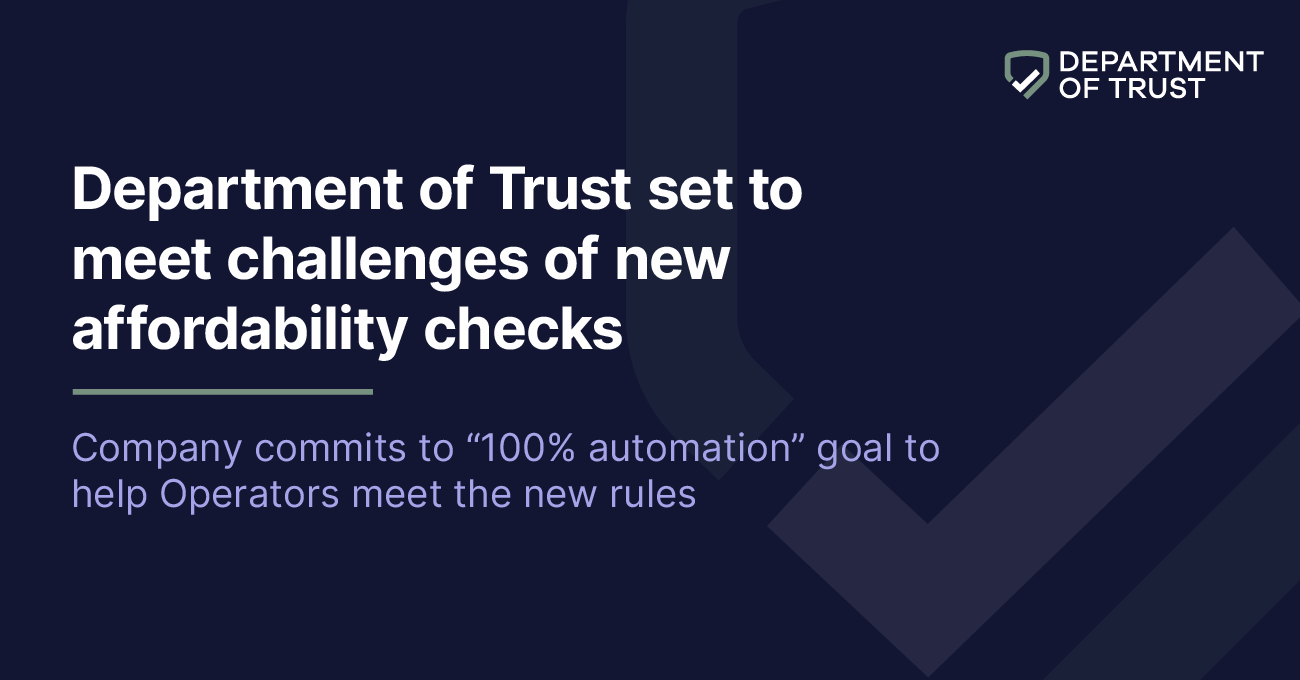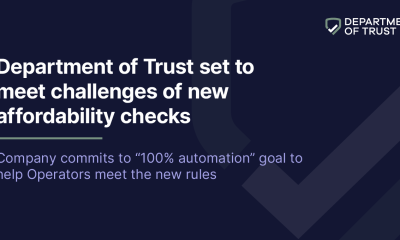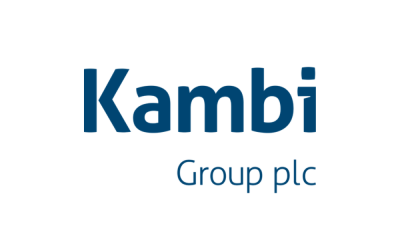Compliance Updates
PRIZE DEBT: CALLS TO REVIEW GAMBLING REGULATIONS AS CONSUMERS RACK UP MILLIONS ON CREDIT CARDS

· Consumers spent £117m on credit cards entering prize draws and competitions, which are not currently regulated by the Government, in a bid to win dream prizes(1)
· Promise of a charitable donation makes nearly half of participants more likely to enter
· Jumbo Interactive calls on the UK Government to regulate the growing prize draw and competition market and for a clampdown on credit cards use
The UK Government is being urged to review current gambling regulations, as new research reveals consumers are racking up millions on credit cards entering popular prize draws and competitions.
The research from Jumbo Interactive found consumers spent £117m on credit cards entering prize draws and competitions in the last year, which due to a loophole, are not currently regulated in the same way as lotteries and raffles.
The study found nearly one in 10 people who entered ‘big ticket’ prize draws, offering the chance to win multi-million pound houses or luxury cars, or prize competitions, have ended up in debt as a result.
Using credit cards to gamble was banned in April 2020, but a loophole in regulation means there are currently no restrictions on commercial prize draw or prize competition companies. For prize draws, this is because they offer “free” entry methods, where it’s possible to play by post for the cost of a postage stamp. Yet, despite this ‘free to enter’ route, an estimated £860m was spent on entries into prize draws in the last year[iii].
Prize draws and competitions that promise a donation to charity also makes 45% of participants more likely to enter, yet over half of players (57%) admit to not checking how much actually goes to good causes.
Jumbo Interactive is now calling for greater regulation of the growing prize draw and competition market, highlighting significant consumer protection concerns over credit card debt, as well as a lack of transparency around prizes and charity donations from entry fees.
It is also urging consumers to check the T&Cs as there is little enforcement of minimum donation percentage for prize draws and competitions. This compares to regulated society lotteries, which give a minimum of 20% of gross ticket sales and often over 50% to good causes.
Nigel Atkinson, UK General Manager, Jumbo Interactive comments: “A huge amount is being spent on credit cards on prize draws, pushing people into debt – despite the free entry option being the reason they are exempt from oversight. With so much money changing hands, the government needs to look at the proper regulation of prize draws and competitions to better protect consumers.
“For many, the fact that some of the cost of entering prize draws and competitions goes to charity is a big part of why they enter. But it remains easy for companies to bury information in the terms and conditions about how much actually goes to charity. Society lotteries on the other hand have minimum donation rates and help raise funds for a wide range of important causes, large and small. Public trust is crucial for society lotteries to operate successfully, and increased regulation of the prize draw and competition market will offer that consistency and transparency.”
Tony Vick, Chair of The Lotteries Council, adds: “The Lotteries Council is increasingly concerned about the use of prize draws operated by commercial gambling companies which are marketing themselves in a similar way to charity lotteries. Lotteries face a series of legislative hurdles that restrict our ability to grow and raise funds for good causes while prize draws face no limits on how many tickets they can sell, what prizes they can offer, and choose whether and how much to give to any charity. We hope the Government looks at this to ensure a fairer playing field.”
Falling foul of scams has also been an issue for 15% of entrants, including paying money for postage on a prize that never arrives, paying a significant amount of money on phone calls or texts to enter a competition without it being clear that it would cost that much, or winning a prize that turned out to be of less value than advertised.
Notably, 72% of those who enter lotteries, draws or competitions think prize competitions and prize draws should be regulated in the same way as gambling.
Powered by WPeMatico
Compliance Updates
A New Analysis by EGBA Reveals Notable Shift Towards Multi-licensing for Online Gambling Across Europe

A new analysis by EGBA concludes that 27 out of 31 European countries employ some form of multi-licensing for online gambling, with an overwhelming majority implementing a full multi-licensing approach.
In recent years, Europe has experienced a remarkable transformation in online gambling regulation. Just fifteen years ago, the landscape was vastly different. Most European countries lacked dedicated regulations for online gambling or operated under exclusive rights models where only state-owned entities had a monopoly to offer online gambling services.
But fast forward to today and the situation has evolved significantly. A new analysis by the European Gaming and Betting Association (EGBA) concludes that the multi-licensing model has become the predominant regulatory approach in Europe. Under this model, multiple companies are permitted to offer online gambling services within a country, provided they comply with strict regulatory obligations.
Key findings of the analysis:
- 27 out of 31 European countries have adopted some form of multi-licensing, indicating a robust trend towards open, competitive markets.
- Four countries currently do not have any form of multi-licensing: Finland, Iceland, and Norway maintain exclusive rights models, granting state-owned entities a monopoly over all online gambling services, while Luxembourg lacks dedicated regulations for online gambling.
- Of the 27 countries with multi-licensing, 23 countries have a full multi-licensing model for all regulated online gambling products in those countries.
- Four countries have a mixed model with partial multi-licensing: Slovenia and Switzerland each have a monopoly for online sports betting, while Austria and Poland each have a monopoly for online casino gaming and poker, with multi-licensing for all other online gambling products.
- Cyprus (casino gaming and poker) and France (casino gaming) each impose product-specific prohibitions but both have multi-licensing for all other regulated online gambling products.
- Finland is currently undergoing legislative reforms, and is expected to establish a multi-licensing framework for online gambling in 2026.
Maarten Haijer, Secretary General of EGBA, said: “The momentum towards full multi-licensing for online gambling in Europe is undeniable. While a few exceptions still exist, governments are concluding that public policy objectives, particularly related to consumer protection and tax generation, are more effectively met through well-regulated online competition. Finland’s current transition towards multi-licensing signals the impending end of the last online gambling monopoly in the EU, marking a significant regulatory milestone.
“Similar deliberations regarding the future of the online monopoly are inevitable in Norway and Iceland. Furthermore, the handful of countries with either partial monopolies or product prohibitions should strive for greater consistency and effectiveness in their policies by phasing these out. With over 15 years of regulatory experience in Europe, it’s clear that full multi-licensing offers the best pathway to enhance consumer protection, increase tax revenues, and ensure stronger regulatory control. The time has come for the last remaining European countries to embrace this optimal form of online regulation.”
The post A New Analysis by EGBA Reveals Notable Shift Towards Multi-licensing for Online Gambling Across Europe appeared first on European Gaming Industry News.
Compliance Updates
Spinomenal is now a registered provider in Peru

Spinomenal, the leading iGaming content provider, has expanded its Latin American presence by registering as a service provider in Peru. The approval from Peru’s Ministry of Foreign Trade and Tourism (MINCETUR) allows Spinomenal to provide its casino titles to the country’s locally licensed operators.
With Peru’s recent introduction of new gaming regulations, the iGaming environment is set for an exciting transformation. Spinomenal is thrilled to be part of this dynamic evolution, offering our state-of-the-art gaming solutions to energise and enhance the gaming experience within Peru’s thriving iGaming community.
Peruvian players will now be able to enjoy Spinomenal’s popular portfolio of games and some of the gems available are Majestic King and Demi Gods V.
Spinomenal CO-CEO, Lior Shvartz commented: “Latin America continues to be a key region for us and we’re proud to now be able to offer our titles within the regulated Peruvian market. Games have been hand-picked for Peruvians based on localised knowledge of player preferences gained by our experience in the market prior to the new regulation.”
Compliance Updates
Department of Trust set to meet challenges of new affordability checks

Department of Trust (dotrust.co.uk), the award-winning provider of financial risk assessments for safer gambling is poised to meet the challenges of the newly announced regulations on frictionless financial checks by the UK Gambling Commission and Betting and Gaming Council.
Under the new rules published by the Gambling Commission, operators have until August 30th to implement frictionless checks on all customers making £500 net deposits in any rolling 30-day period. These frictionless checks form part of a new regime designed to protect players at risk of financial harm and replace the current ad hoc approach to affordability checks.
Department of Trust also welcomes the interim voluntary code published today by the Betting and Gaming Council (BGC), the standards body representing over 90% of UK-regulated market operators. This code focuses on how responsible operators should support customers spending above the lower threshold set out by the Gambling Commission.
The supplier’s DoTrust Complete solution offers an integrated suite of frictionless and enhanced financial risk checks with a high level of automation capability -the only such tool built solely for safer gambling – and is perfectly positioned to help businesses navigate the newly regulated waters.
Charles Cohen, CEO of Department of Trust, said: “These important announcements flag the end of gambling’s ‘sus law’ where players faced seemingly arbitrary requests for personal information, operators were placed under a significant burden, and no one won
“We now know that in 120 days, every operator will need to perform frictionless checks on all players with net deposits in a 30-day rolling period of £500. A few months later this will fall to a much lower level.
“If operators want to protect their business, keep their customers and reduce costs, smart automation is the only answer.
“Department of Trust has spent over two years building the leading plug-and-play solution specifically for the gambling industry. Complete already automates over 90% of the processes required in both the new LCCP and BGC code. Now we know what the requirement will be, we are today committing to the goal of 100%. We want every operator and player to have instant assessments and sensible decisions cost-effectively. No one needs to lose sleep over this.”.
The post Department of Trust set to meet challenges of new affordability checks appeared first on European Gaming Industry News.
-

 Amazon Web Services (AWS)6 days ago
Amazon Web Services (AWS)6 days agoOpenBet bolsters compliance technologies with the launch of geolocation product, OpenBet Locator™, powered by Amazon Web Services (AWS)
-

 Argentina6 days ago
Argentina6 days agoPlay’n GO breaks new ground with entrance into third Argentinian province
-

 Latest News6 days ago
Latest News6 days agoRealistic Games introduces endless spins in Maxiplier
-

 Compliance Updates6 days ago
Compliance Updates6 days agoDepartment of Trust set to meet challenges of new affordability checks
-

 Latin America6 days ago
Latin America6 days agoPaysafe strengthens US iGaming solution with Pay by Bank launch
-

 Gambling in the USA6 days ago
Gambling in the USA6 days agoKambi Group plc extends Mohegan partnership with on-property sports betting agreement in Pennsylvania
-

 Clark County5 days ago
Clark County5 days agoClark County residents can bring a friend for free to next week’s Super Bingo $160,000 tournament at the Plaza Hotel & Casino, May 6-8
-

 Industry News5 days ago
Industry News5 days agoGenome and Chilli Partners join forces to revolutionize iGaming affiliate payouts




















